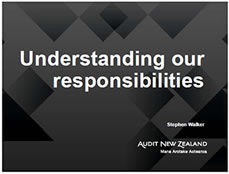Understanding our responsibilities
Understanding our responsibilities
Presentation by Stephen Walker, Executive Director, Audit New Zealand
Welcome
Kia ora tātou katoa
 Today, you will hear from a wide range of speakers who cover various topics, yet all linked together by some connecting themes – stewardship, leadership, accountability, and governance; the importance of understanding and delivering on our roles and responsibilities; and the benefits of working collaboratively.
Today, you will hear from a wide range of speakers who cover various topics, yet all linked together by some connecting themes – stewardship, leadership, accountability, and governance; the importance of understanding and delivering on our roles and responsibilities; and the benefits of working collaboratively.
For my part, I want to open the session by touching on the responsibilities we each have (governors, managers, or auditor) in relation to accountability, and the importance of good reporting to support and demonstrate the discharge of those responsibilities. We each have responsibilities in this space. We equally have expectations of the other.
 At a time when we are all facing significant changes, we each have to understand and meet our responsibilities, share our expectations, deliver, and where things change (as they will) keep each other well informed.
At a time when we are all facing significant changes, we each have to understand and meet our responsibilities, share our expectations, deliver, and where things change (as they will) keep each other well informed.
If you are in a governance role, including an advisory role such as an Audit Committee member, yours is a critical role.
Given the different business models across the public sector it is not surprising that there is some confusion about roles and responsibilities. We are seeing far greater emphasis on the importance of these roles. Whether you are an audit committee member/chair for a department, a Crown entity board member, a senior manager acting in a programme/project governance capacity on a significant ICT project, you need to make sure you understand your role and its responsibilities.
Your principal role is to ask questions of management – and to keep asking until you are satisfied you understand exactly what you are being asked to do and decide. Provide rigour and challenge. Being passive in your governance role is not an option. You have to understand, which means having sufficient information to enable good advice and decision-making.
While your organisation’s management and the auditors will have a more active role in preparing and auditing your organisation’s accountability documents, you as the governance representatives, are responsible for, or have oversight of, all major decisions about the use of public funds.
All your major decisions are potentially covered by the audit. Unlike in the audit of a private business, a public sector audit also covers key non-financial decisions, so pretty much any significant decision you make or piece of advice you provide around the board or committee table is likely to be touched by the audit.
For senior management…
- Be clear about your strategic direction for the long term, not just the immediate strategic direction. What actions are required to implement the long term objectives and then report effectively?
- Ensure you have the right people, skills, knowledge, systems, technologies, procedures and controls in place. Particularly essential is that you have sufficient financial and other expertise to manage your affairs. Where you don’t have the right things in place, make the necessary investments, although contracting out has its limits.
- Be clear about how you are managing and reporting risk as an organisation and at a significant project level. You cannot outsource risk.
- Being fully aware of your operational parameters, such as legislative requirements, new reporting requirements, and the impact of changes to those requirements.
- Have the right governance structures in place and make sure they are used effectively.
Our responsibilities – We do this within a framework of audit (i.e. standards, professional expectations, Auditor-General's expectations, and a code of ethics).
Our role is to give an independent opinion on whether the information you report fairly reflects your organisation’s planned and actual performance.
We also have a wider reporting responsibility to you, to the Auditor-General, and ultimately to Parliament and the public.
The audit provides reasonable assurance that you are meeting your legislative and accountability requirements. That’s not absolute assurance and does not mean we’ve tested every transaction or disclosure, or looking at every aspect of your entity’s operations and activities.
We look at your underlying systems in order to plan the most efficient and effective audit approach – to assess which controls we wish to place reliance on and test. If we identify areas we believe can be improved we will report these to you...but this is quite different to providing assurance on internal controls in its own right.
While we don’t look at everything, our focus is on improving performance, and the public’s trust in the public sector, through the way we do our work.
We all have to live up to our responsibilities. Our challenge, like yours, is our responsibilities and the way we are required to perform our work, change all the time. And we spend a lot of time making sure we have the right skills, expertise and knowledge to perform your audits.
When it comes to the changing accountability, transparency and public reporting requirements it is essential we all understand what we are responsible for. In your role, are you on top of the changing requirements?
Delivering on our responsibilities
 What are we focused on to make sure we deliver on our responsibilities:
What are we focused on to make sure we deliver on our responsibilities:
Understanding your entity and how you plan to/are addressing your responsibilities and risks.
Last year, Clint Ramoo and I both stressed the importance of understanding your entity, particularly what your strategic direction is, the risks involved, and how you plan to get there. We continue to place a lot of emphasis in this space, and make no apologies by the variety of people we need to talk to.
Investing in the things needed to deliver quality audits.
Like you, we have to continually assess whether the tools, methodologies, approaches that we use are fit for purpose. While I am confident that at any given point they are, we continue to invest in a range of things that support our audit teams on the ground, and to deliver you a good quality audit.
You may notice that we're doing things differently than in the past. If you don’t understand and you’d like to, talk to your audit director and manager.
That doesn’t mean we get it perfect every time and we all have a responsibility to communicate where we have concerns. If you have concerns, I expect you to take it up with your audit director. Equally if we have concerns I expect us to have the appropriate conversation with you.
Focusing on our reporting having greater impact, and working with you to deliver within agreed timeframes
Like anything, you can do the best piece of work you think possible, but report on it poorly or late. We are no different sometimes when it comes to our audit reporting. We are placing greater emphasis on our reporting, both in terms of impact and timing. You have a role to play with this. We invite you to comment on our reporting, as a means to demonstrate you understand and to share what your intended actions are in response. We are seeing greater interest by audit committees with our reporting and how management respond. We will be more actively managing the report finalisation process.
Investing in sector and technical knowledge
 I said I wanted to come back to what we are doing by way of investing in sector and technical knowledge. We are putting a huge amount of effort into this space to get ourselves prepared for some key changes, namely new legislative and financial reporting requirements.
I said I wanted to come back to what we are doing by way of investing in sector and technical knowledge. We are putting a huge amount of effort into this space to get ourselves prepared for some key changes, namely new legislative and financial reporting requirements.
Make sure you understand your new legislative requirements – we have known for some time about the State Sector Public Finance Reforms impacting on the Public Finance Act, the State Sector Act, and the Crown Entities Act. While not all of the changes are about accountability, many of them do affect our audit role and responsibilities. We are making sure:
- our audit staff operating in the sector have knowledge of the legislative changes;
- our audit approaches reflect the new requirements; and
- we engage with you about how you are addressing the new requirements.
One of our challenges is that there is flexibility in how your entity adopts the new requirements. So while we have a role, this is more about how you plan to address the new requirements in your planning, budgeting, execution, and reporting.
Later today, Stephen Lewis will talk about the new accounting standards framework requirements.
Like the legislative change, the new accounting standards framework has been signalled for some time. The changes allow entities to move away from the one size fits all model of reporting at the moment. Your first step is to determine the right reporting tier for your organisation… don’t do more than you have to do.
While we don’t consider these reporting changes to be anywhere near as significant as International Finance Reporting Standards (IFRS), there are differences, and they still require you to be prepared for the change.
We are making sure our staff are well trained in the new reporting requirements, our approaches are adjusted, and our client support tools (e.g. Model Financial Statements) are updated.
You will all have to go through some transitional effort over the coming year, and I will be writing to all the public entities we audit shortly about the approach we will be taking to auditing your transition. This is to ensure the approach taken is as efficient as possible for you and us.
We will need you to understand and act on the new legislative and reporting requirements. We will be clear about our responsibilities and deliver against those, but we will need you to be prepared and take an active role in meeting your responsibilities.
Key messages
 Last year, I emphasised that the quality of engagement we have with you is directly linked to the quality of the audit and the value you receive from it.
Last year, I emphasised that the quality of engagement we have with you is directly linked to the quality of the audit and the value you receive from it.
This continues to apply, and is particularly relevant when changes to responsibilities are occurring. It is critical that we understand your entity, particularly what your strategic direction is, the risks involved, and how you plan to get there.
Whether you are in a governance, a management, or an auditor role we all have important accountability responsibilities. We all have to make sure we understand them fully, and are in a position to act on them.
We continue to be committed to our role and take our responsibilities very seriously. We continue to enhance the way we deliver on our responsibilities and where necessary we are making significant investments in our people and approaches.
Our role supports you in meeting your responsibilities, but we can’t do it for you. We need you to be prepared.
Key is keeping each other well informed about how we are meeting our responsibilities, what our expectations are, and what’s going on, and then we both can deliver.
Thank for very much and I am confident you will take a lot out of the sessions during today.
